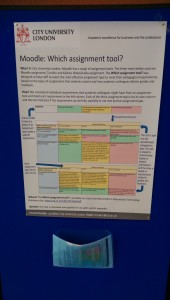I was fortunate to be able to attend this year’s Moodlemoot, hosted by Dublin City University (DCU) on 11th-14th May 2015. As an Educational Technologist supporting blended learning, Moodle plays a big role in my working life, and this was an interesting and valuable opportunity to spend time with other Moodle users, including developers, educators, technologists and colleagues from Moodle HQ.
A number of workshops and working groups took place on Day 1, and on Day 4 there was a Hackfest for Moodle Developers. The core part of the conference was on Days 2 and 3. On Day 1 I attended the Dashboard working group, hosted by Dr Mark Glynn of DCU, which included helpful contributions from Mary Cooch of Moodle HQ among others. See Mary’s reflections on Moodlemoot 2015.
The Moodle Dashboard is the new name for the My Moodle (home) page for Moodle 2.9* which is not to be confused with the Moodle Dashboard that has been developed in-house at City University London (City) and which appears on most Moodle modules.
(*City is currently on version 2.8 of Moodle).

The Dashboard workshop provided a fascinating opportunity for Moodle users to make suggestions for improvements to core Moodle, based on local developments that have been made at individual institutions. Dr Mark Glynn shared information on DCU’s relative grades plugin which shows a student’s grade against a colour-coded z-score, and Mark also provided an overview of DCU’s learning analytics plugin.
I demonstrated City’s Activity feed, Favourites and Search Modules box which have been developed for our own My Moodle page.
The main part of the conference started on Day 2. After a very interesting introduction and welcome by DCU’s president, Professor Brian MacCraith, the first keynote was by Dr Bart Rienties from the Open University who spoke about how learning analytics should be a dialogue between students and teachers, with feedback as the driver. I attended two other keynotes during the conference, one by Martin Dougiamas from Moodle HQ, who talked about the importance of feedback and clear goals in Moodle courses. Martin also provided an explanation about the new Moodle Association. The other keynote was by Dr Michael de Raadt, also from Moodle HQ, who gave the opening keynote on Day 2 on the importance of personalised learning where students set their own learning pace and where one size does not fit all. All three keynotes had a pedagogical rather than technical focus and were very thought-provoking and well presented.
The presentations over the two days were split into three streams, Moodle in Education, Moodle in the Workplace and Moodle Technical. This was the first time the presentations had been split in this way. The presentations were all short and included a number of pecha kuchas, meaning that no presenter had time to waste on irrelevant information. I attended the presentations in the Education theme and I heard some very interesting talks on topics such as Moodle quizzes, lessons, grading and feedback, flipped learning, badges, game design, student interaction and online induction.
Discussions at the Hackfest on Day 4 were around prioritising and implementing some of the suggestions made at the working groups on Day 1. Sadly, I left Dublin at the end of Day 3 but I am looking forward to hearing about progress made at the Hackfest.
There were eleven poster presentations at Moodlemoot, including City’s own poster introducing our Moodle: Which assignment tool? which can be found on our Educational Technology guidance site. I was delighted to note that Gavin Henrick, the conference organiser, mentioned City’s poster, along with two others, in his blog post about Moodlemoot 2015. I was pleased to have to renew the supply of poster handouts each day. I felt very proud to have made a useful contribution to the Moodlemoot conference on behalf of City.

At the end of Day 2 we all attended the conference dinner in the Crowne Plaza Hotel, which was very enjoyable and even included a live band.
To sum up my first experience of Moodlemoot: tiring; enjoyable; extremely useful, full of interesting people and definitely thought-provoking.




